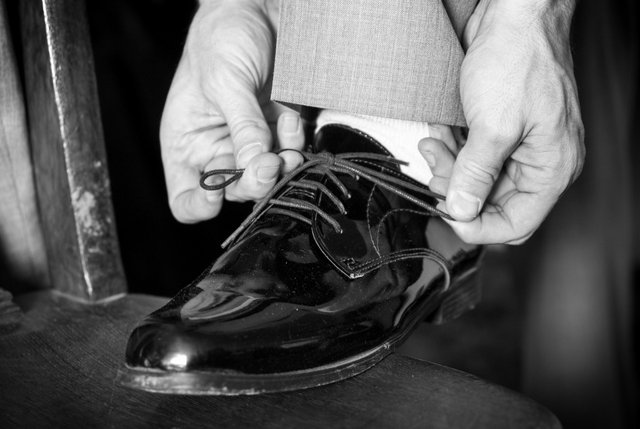The Most Important Skill You Can Develop
There is nothing more important to your overall success and happiness in life, no matter what your goals or definition of happiness is, than the habits you adopt and maintain. The habits you have ingrained are the things that define you as a person.
Lets take a deeper look at why this is and how we can improve our own habits.
We are what we repeatedly do. Excellence, then, is not an act, but a habit. - Aristotle
What is a Habit?
A habit is a consistent way of interacting with the world that does not require significant conscious effort to execute. In effect, it is a our conscious mind turning off and handing the reins to automatic memory.
Remember when you first learned to tie your shoes? The task was very complicated for your young mind and required you to think carefully about each step. Do you remember tying your shoes this morning? If you remember it at all, it is a vague blur and the process is almost entirely unconscious.
Your brain transitions from the neocortex - the high thinking, high energy usage part of the brain, to the more autonomic lymbic part of the brain, requiring little to no energy. This is an adaptive evolutionary trait, because it allows us to conserve a significant amount of mental energy for the times when we we need it. But, when you adopt bad habits then these automatic actions can become a prison rather than a support.
The goal isn't just to eliminate bad habits (e.g. smoking) but also to upgrade all your suboptimal habits. Even something as simple as shoe tying can be improved.
Habits of the Mind
The chains of habit are too light to be felt, until they are too strong to be broken - Warren Buffet
Habits do not just control physical activities like tying your shoes, flossing, and exercising. Habits are also the driving force behind our intellectual, emotional, spiritual, and social lives.
We all have emotional triggers and habitual responses programmed into us from a young age. Some of these are genetic, such as the response to hearing a baby cry or a loud noise. Some of these are learned, such as how we react when criticized or if we see something offensive.
Our brain takes these behavior shortcuts to save us the trouble of having to think through our response to every situation. Some of these automatic responses are helpful (e.g. pulling your hand back from a stove when it burns), but some are harmful (e.g. The instinct to run when you are on fire, rather than stop, drop and roll). Our automatic emotional responses shape our lives and how we perceive the world around us.
Think for a moment about how you respond in the below situations.
- When you encounter a stranger, do you habitually respond with compassion, openness, and curiosity or with suspicion, fear, and defensiveness?
- When you start each day are you grateful for what you have or anxious about what you might lose?
- Which forms of speech, behavior, or lifestyles trigger an immediate strong emotional reaction in you, bypassing logic and driving you to action?
It is only once we begin to examine our current set of habitual responses, that we can then begin to isolate and change those that are disruptive to the life we want to live, while cultivating those that make us the person we want to become.
Fortunately, the path to using your conscious mind to train your unconscious behaviors is not a complicated one. Scientific studies have shown us the best way to create habits, and many successful people have given us examples of how this can be done. Each step requires willpower and dedication, but only until the old habits are replaced. Once the new habit is ingrained (something that can happen in as little as 3-4 weeks), then the automatic response works in our favor, driving us without effort to do the right thing and become the best version of ourselves.
How to Form Habits
I’ll let you in on a secret...
I’m mostly really dumb.
I’m sorry to say, so are you.
The human brain has developed over hundreds of millions of years, and the part that we consider the reasonable, rational mind- the neocortex- has only been around for a small fraction of that time. It is like a layer of icing on top of a giant cake
That means that most of what drives our behavior and makes us, “us” is a dumb, animal brain. The rational, reasoning mind, has very little power compared to the ancient animal brain. Just think about how hard it is to rationally decide not to be afraid of a spider; or to turn down that piece of cake right in front of you.
The “secret” to reaching our goals in life, is to find ways to train our dumb animal brain so that it generally does what our rational, thinking brain would want it to do.
We need to build good habits.
Classical Conditioning
Habitual responses are developed through repeated connection to an already ingrained trigger point in our lives. Much like Pavlov’s Dogs were trained to salivate in response to a pre-dinner bell, we too can link our preferred behavior to the stimulus around us. This is done at first through conscious effort of consistently linking a given stimulus with a given response.
Once the process continues long enough, the link will be automatic and the habit will be ingrained. After that, you can move on to another habit and slowly build a chain of behaviors that supports you in whatever your goals are in life. Here are some tips on how to accomplish just that.
1. Pick one small habit at a time
The temptation when trying to form habits is to try and do everything at once. How many times have you made a new years resolution to go to the gym everyday, eat healthy, and stop drinking only to find that within a few weeks all of those plans were out the window? Habit forming is hard, so start small!
Experiment to see what works best for you, but even the smallest increment (e.g. 1 pushup a day, floss 1 tooth, drink 1 extra glass of water each day, etc.) will add up and have huge impacts over time. The small habit change you maintain is far more powerful than the big habit change you never adopt.
2. Link the habit to a consistent trigger
Trigger events are powerful tools to make sure your habits stick. Train your body to know that everytime A happens, B happens next. If A is a consistent part of your life, soon enough B will be too. Some examples
- Everytime you brush your teeth, floss
- Everytime you get out of bed, meditate for 5 minutes
- Everytime you get up from your desk at work, stretch for 2 minutes
Soon, your new habits will become triggers for even more habits (e.g. After flossing, use mouthwash). This ability to “stack” good habits compounds over time to lead to profound life changes.
3. Track your adherence
“What gets measured gets managed” - Peter Drucker
Find a visible way to track your habit. Put a calendar on the wall with a big X on it whenever you accomplish your habit for the day. Use an online tool like habitbull.com or coach.me. Gamers can use the RPG-like habitica.com. Take notes on a piece of paper on your desk.
I recommend that you pick a tracking method you will see everyday- the visibility of the system matters a lot for long term adherence. If you find trouble tracking your habits, focus first on the habit of checking your habit list each day.
4. Maintain the habit for one month, no matter what
Commit to your habit choice for 30 days. Most studies indicate that it takes 21-28 days for a habit to become automatic. You will want to quit within those 30 days. The motivation you feel on day 1 will not be the same on day 20. Push through those slumps! This is the period where willpower is needed most. Once you get past the 30 day window, automatic responses will kick in and you won’t need willpower anymore.
5. Review and evaluate
After the 30 days, ask yourself how it went. Did you succeed in tracking your habit everyday? Did the habit stick? If not, what went wrong? How can you change your environment to make the habit easier? Could you try a smaller version of the habit next month? If the habit is now ingrained, what is a good next habit to stack on top of it (e.g. Can 1 pushup a day become 5?).
6. Repeat
Do this challenge every 30 days with a new habit and within a year you will have 12 new habits! Even though each step is small, the cumulative effect is impressive and should encourage you to keep going after each success.
7. Bonus: Get accountability support
To make habits even more likely to stick, enlist the help of a friend (or enemy). Use social pressure as a tool to apply leverage to yourself. Make very public commitments that would make it embarrassing if you gave up your habit. Have a friend who checks in with you everyday. In more extreme cases, you can even put penalties in place to help give you extra incentive. Sites like beeminder.com and stikk.com are Commitment Devices, that will charge you if you derail from your habit or goal.
Writing for steemit was a habit I started for myself with a commitment to publish an article at least once a week. I’m happy to enlist all of you as my support for continuing on this goal. For November, I am going to begin creating audio content each week as well. If you want to join me for a November habit commitment, post your new habit in the comments!
(pictures above sourced from pixabay.com)
Hi, I’m Justin!
I love designing, gaming, debating, reading, writing, dancing, meditating, learning, and helping others. Learn more about me here.




This is such a great method for making actions automatic, your writing is excellent too. You got yourself a new follower!
Thank you so much for the comment and the follow! :)
Great post. I just read "The Power of Habit" by Charles Duhigg and it was fascinating. I started working on some habit building exercises following that and use the smartphone app "Strides" as my tracking mechanism. Those unbroken streaks of completion do get addictive!
I use these habit building exercises to create routines for practicing a variety of artforms. Great stuff!
Great post, esoteric knowledge!!
I like that.
I will follow you to stay up to date.
Cheers, and keep going!!